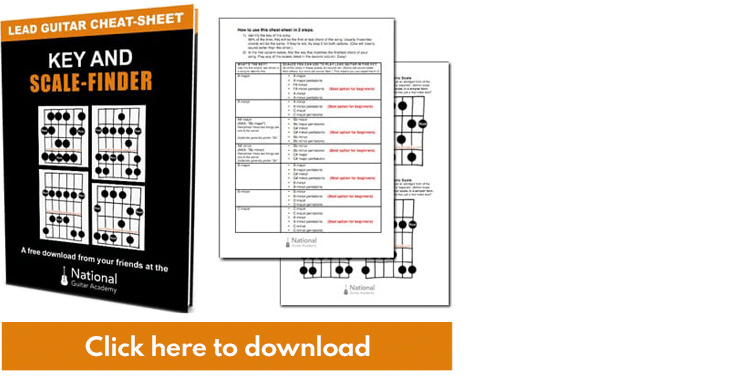Learning the intervals of the major pentatonic scale
Just like our major pentatonic scale, each of the notes in a major pentatonic have a specific interval relation with the root note.
Here’s what the intervals in a major pentatonic are :
- The Root
- The Major Second
- The Major Third
- The Perfect Fifth
- The Major Sixth
Can you see how these intervals are different from the minor pentatonic scale? This is because this time, we’re dealing with a major pentatonic scale.
The blueprint of this scale is ALWAYS going to be the same. Whatever key we’re in, we’ll ALWAYS be playing these intervals.
The notes of a major pentatonic scale
Let’s learn this scale in the key of G major.
The notes in a G major pentatonic are :
- G – Root
- A – Major Second
- B – Major Third
- D – Perfect Fifth
- E – Major Sixth
Here’s what those notes look like ALL over the fret board.
G Major Pentatonic – Full Fretboard
Download our lead guitar cheat-sheet to make things easier
It's hard to understand which scales work with which keys.
So we created a cheat-sheet! A key and scale-finder that you can use again and again.

Get your personalised guitar-learning plan 🎸
Get a custom guitar-learning plan here: Click here for GuitarMetrics™
World-Class Guitar Courses 🌎
Learn from the world's best guitar educators: Click here for our guitar courses
Other types of major and minor scales
In music, there are hundreds of different scales.
However, your core fundamental scales are :
- The Major Scale
- The Minor Scale
These are what form the foundations of ALL music!
You might be wondering, hang on a minute. You’ve been going on about pentatonic scales for the last 20 minutes, what on earth are major and minor scales?
- Major and minor scales and pentatonic scales are the SAME thing.
- Pentatonic scales come from major and minor scales.
I like to think of major and minor scales as the ‘parent scales’, where as pentatonic scales are the younger, cooler version of these scales.
- The pentatonic scale has 5 notes.
Where as the major and minor scales have 8 notes. These are larger versions of your pentatonic scales.
- The Major Scale = The Major Pentatonic.
- The Minor Scale = The Minor Pentatonic.
Let’s compare between the two.
The Major Scale
For this example, let’s use the key of G.
In a G major scale the notes are :
- G
- A
- B
- C
- D
- E
- F#
Here there are 7 notes.
In a pentatonic scale, we only use 5 notes.
The G Major Pentatonic
Let’s take a look at what notes are in the G major pentatonic.
- G
- A
- B
- D
- E
Can you see how these notes are taken from the G major scale? (The ‘parent’ scale?)
Let’s try this with the minor scale.
The Minor Scale
For this scale, we’re going to use the key of E minor. Let’s take a look at what notes are in the E minor scale.
- E
- F#
- G
- A
- B
- C
- D
Just like our major scale, there are 7 notes here.
Let’s compare it to the minor pentatonic scale.
The Minor Pentatonic
The notes in a E minor pentatonic are :
- E
- G
- A
- B
- D
Just like our major scale, these notes are also in the minor scale.
If you’d like to know more about guitar scales, go here: Learn Guitar Scales In 8 Easy Steps
Why would you need to know the pentatonic scale?
Pentatonic scales are really useful to know.
Scales are what help you to create music, they give you the fundamentals to:
- To help your technique.
- To help you learn faster.
They are incredibly useful. For most lead guitarists, this is the DNA of playing lead guitar.
How to play and practice your scale technique
One of the best ways to practice guitar technique is to use guitar scales. Pentatonic scales have the advantage over other scales, as they’re naturally much shorter.
This means you can practice your technique in a far more efficient way.
Quick tips for improving your technique
Play ALL your scales SLOWLY.
All students do this… They learn a cool pattern or lick and the first thing they do is try and practice as fast as they can.
This is NOT helpful for developing guitar technique.
One more time: This is NOT helpful for developing guitar technique.
Playing slowly and getting it RIGHT is the most efficient way to build muscle memory and embed the scale pattern into your playing.
Practice your scales to a metronome.
This is a great way of practicing your technique and your timing. Make sure that when you practice your scales you play each note on each click on the metronome.
Here’s a handy metronome site, if you don’t already use one: Metronome online
Alternatively you could download a metronome app on your phone or tablet.
When you play scales fast, here’s what happens
- You don’t learn the scale properly.
If you try to play the scale as fast as you can, your hands can’t process how to play the scale.
As a result of this, it takes you longer to remember the scale.
- You develop bad technique.
If you’re going super fast, you don’t give yourself the chance to make sure you’re playing each part correctly. Take your time.
Here’s what happens when you practice scales slowly
- You remember scales faster.
- Your technique becomes better.
- You become a better guitarist.
One last time: Practice slowly. 🙂
When would you need to know the pentatonic scale?
One of the main uses of the pentatonic scale is to either improvise or to create melodies.
Without the knowledge of these scales, it’s almost impossible to create music.
Here are a couple of musical situations when knowing the pentatonic scale would come in handy :
At a jam session
Let’s say you go to your local jam session, or you regularly meet up with friends to play some guitar.
Having a good grasp of the pentatonic scale is so useful, as it instantly gives you something that you can use to improvise with.
Writing music in a band
Imagine, you’ve written an awesome song with the band that you’re in. But it needs something extra, a little sprinkle on the top.
Sometimes adding a melody in is a great way of adding interest to a song. Without the knowledge of pentatonic scales, it’s much harder to do this. You’re just fishing in the dark.
This is why it’s so fundamentally important to have a good grasp of these scales.
To understand musical theory
Scales form the foundation of chords and musical theory. Having a good understanding of scales helps you understand these elements.
What Type of Guitarist Are You?
Take our 60-second quiz & get your results: Take The Quiz
Join the world's best online guitar school 🌎
- Get your own personalised guitar learning plan (customised just for YOU).
- World-class online guitar courses. Learn at your own pace.
- Community Campus & Learning Forum - A friendly community! Connect with our team & students. 😊
- Beginner Song library with chordsheets, tabs and tips. (Songs suitable for all levels!)
- Regular live streams, seminars and Q&A sessions - Learn from world-class guitar educators. Get all your questions answered!
Click here to learn more about National Guitar Academy membership 
Cool Guitar T-shirts 😎
Look cooler! Check out our merch: Click here to see our merch store
Want free guitar tips and video lessons delivered to your inbox?
Join over 250,000 other guitar learners and subscribe to our guitar-tips-by-email service. (It's free.)
We'll send you a series of lessons that will move you to the next level of your guitar journey.
Learn how everything fits together quickly, easily and effectively. We share ninja tips (for instant fun!) but also timeless fundamentals that will deepen your understanding.

Popular Lessons
How To Learn Guitar: An 11-Step Programme For Beginners
How To Choose The Perfect Beginner Guitar
More Cool Guitar Stuff
Learn about National Guitar Academy: About Us
Visit our YouTube channel for fun guitar videos.
Join us on Facebook for daily guitar tips.
Listen to our Learn Guitar Podcast for rapid guitar progress.
Check out our free chord lessons.
Where should we send it?
Get our best guitar tips & videos









